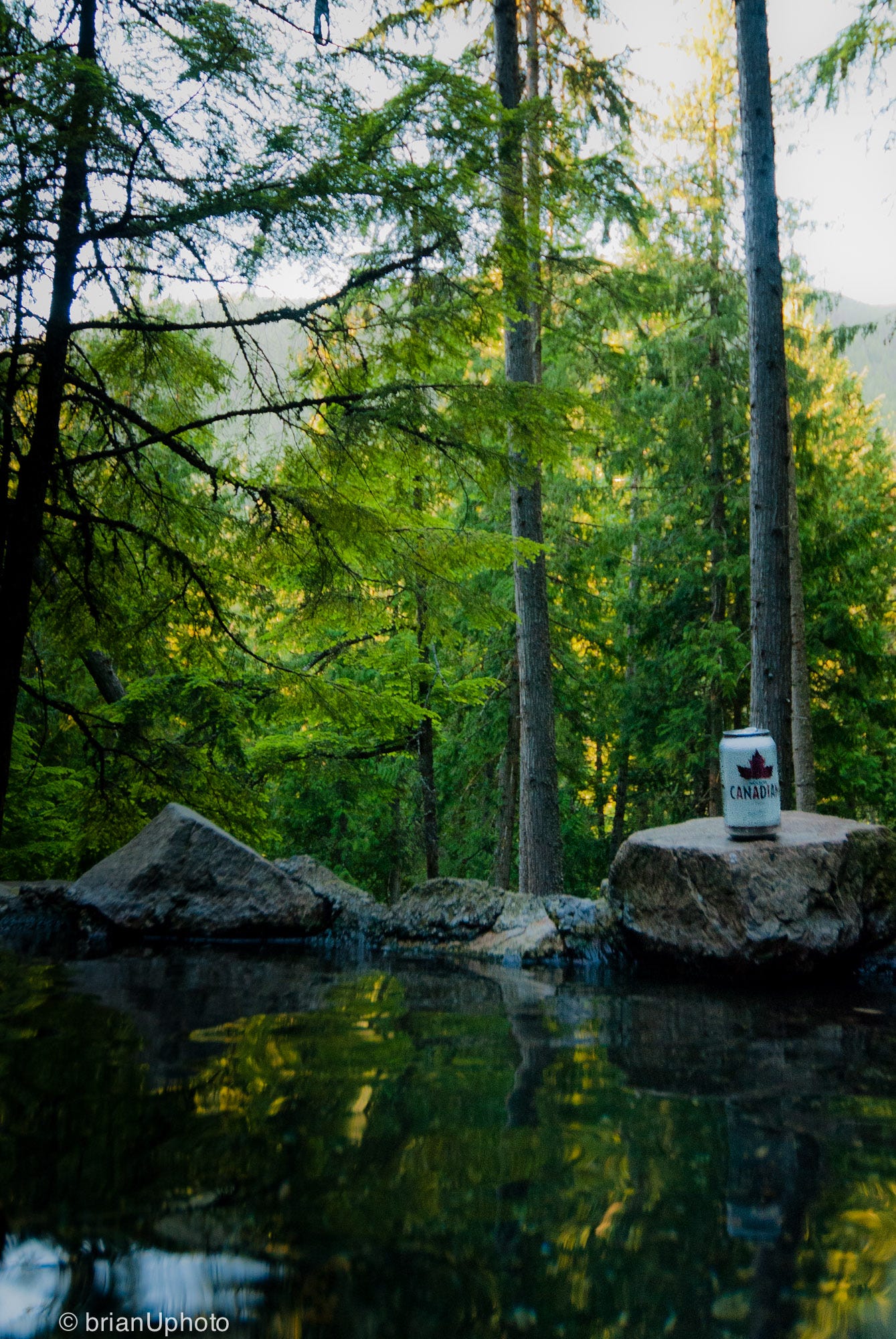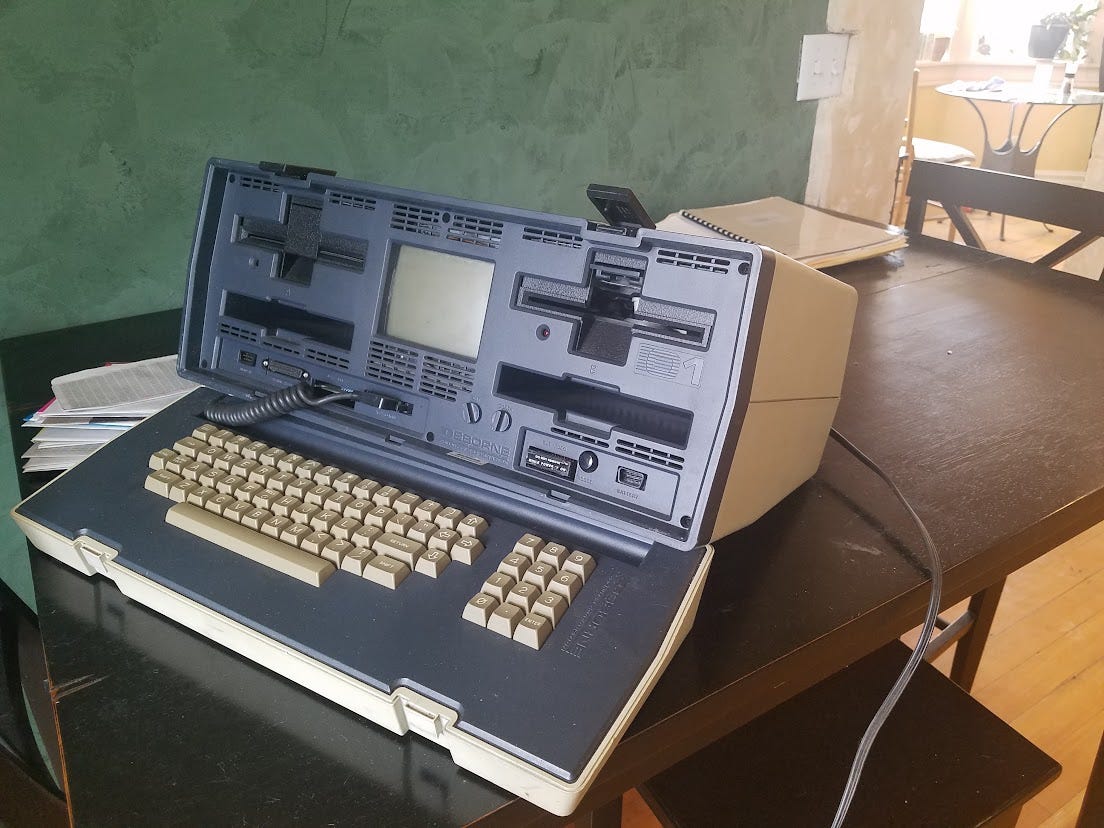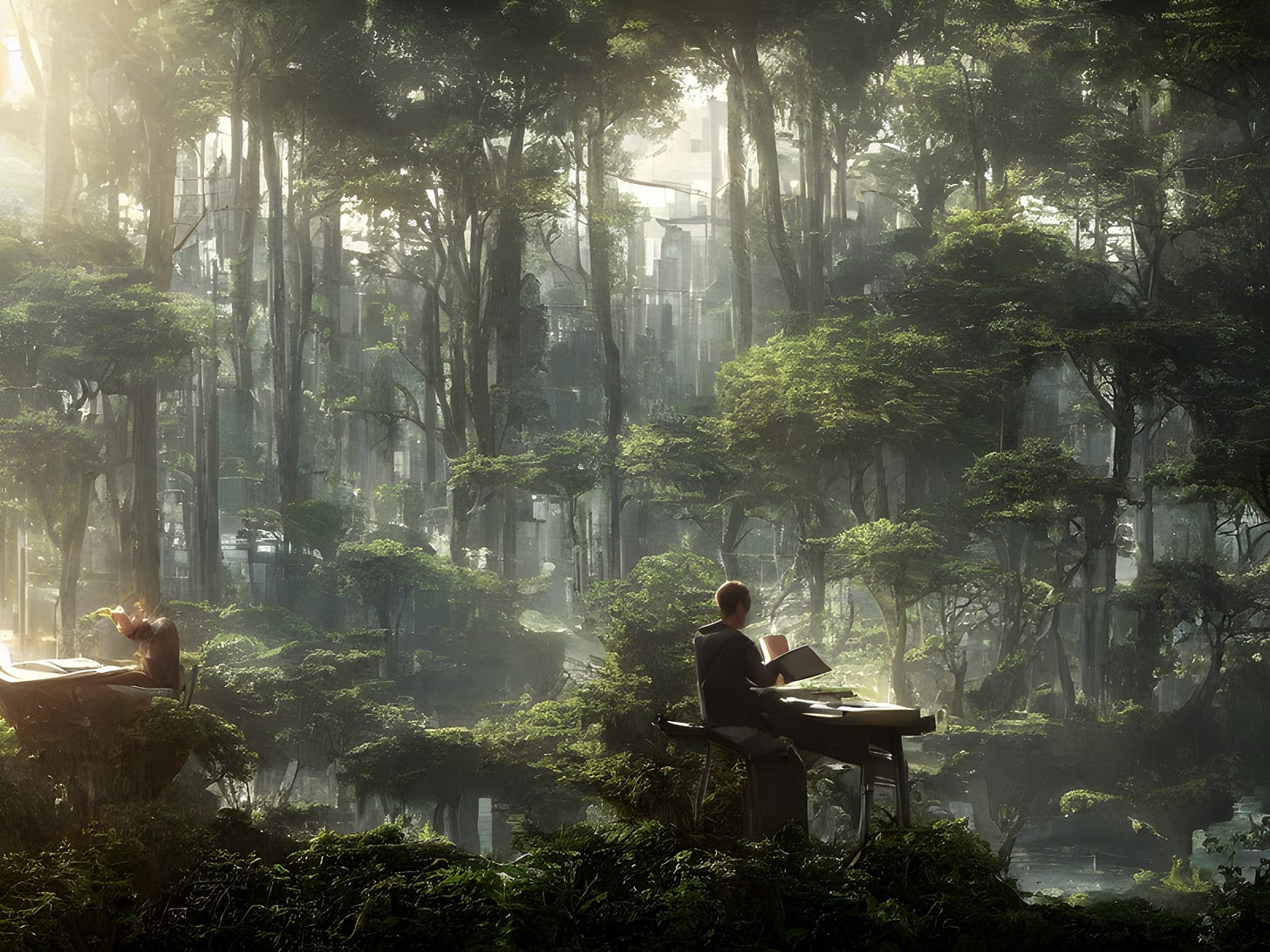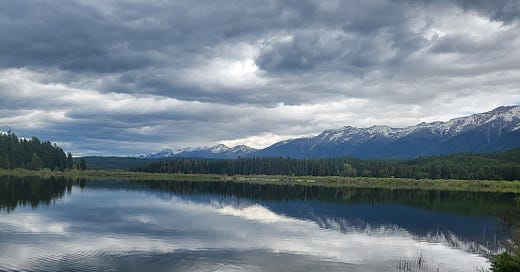The nature of a technology story
Nature is the opposite of technology, and threatened by it—and shaped by it (…as AI demonstrates)
1. You could tell the story of music over the last hundred years as a technology story. The phonograph allowed music to be recorded—and thus to be listened to in remote homesteads. The guitar was electrified, leading to rock’n’roll. Streaming services such as Spotify put the listener in control. Obviously music remains a deeply creative, personal, spiritual endeavor, but technology didn’t merely change the way we access it. Technology changed music itself.
You could tell the story of knowledge over the last hundred years as a technology story. The computer stored vast amounts of information, allowing for better predictions of everything from the weather to public opinion. The classroom was electrified, leading to a world where charismatic lecturers are replaced with online courses. Smartphones gave us access to the vast collected knowledge of civilization right in our pockets—to the point where we tended to downplay its importance compared to ideology. And today some “intelligence” is “artificial.” Obviously knowledge remains deep, quirky, and powerful, but technology didn’t merely change the way we access it. Technology changed our ideas of knowledge itself.
You could tell the story of war as a technology story. Each new technological invention—from the atlatl to the nuclear bomb—gave horrific advantage, and posed horrific new moral choices. War itself is one of the ultimate human mysteries, but technology changes how it affects us, how we see it, what it means.
Religion. Racial justice. Community. Gender identity. Vegetarianism. I could go on… Any issue behind today’s headlines, any issue that your philosophy professor wanted you to contemplate, any development that has shaped our lives in this fast-changing society, could be told as a story of technology.
It would get obnoxious, of course. Having such a single-minded point of view is one definition of a tech bro, and is why they annoy normal people. But as a business writer, this was a trick I kept in my back pocket. When I wrote for software companies, we might frame our case studies of successful implementations—our stories—as showing how technology solved myriad problems. When I wrote for consultants, we might frame our stories around how to solve the problems caused by technologies. I capitalized on the human instinct, framed by centuries of experience, to see stories as technology stories.

2. I remember, when I first when camping, I wanted to be like the guy from the ‘80s radio Molson beer commercial. He keeps asking the young woman in the adjacent site for help, because he hasn’t brought any technology. Indeed all he brought was a case of Molson Golden. Because it’s a beer commercial, she finds this charming and sexy, so the party tonight will be at his site. His punchline: “Do you have a bottle opener?”
Camping, I figured, was the opposite of technology. It was getting out in nature. On my first solo backpacking trip, I didn’t even bring a stove. I had sandwiches for dinner and granola bars for breakfast. I didn’t bring a watch, or a camera, or a pen, or a book. I brought neither a bottle opener nor Molson beer. And since there weren’t any pretty women camped nearby, that choice seemed justified. Yet after I set up the tent, I was bored out of my mind.
On some level, this was the point. The boredom was a withdrawal symptom as I left civilization. Yet on another level, all it did was cause me to criticize my technology-versus-nature decisions. Wasn’t my tent a form of technology? My down sleeping bag, fleece jacket, hiking boots? I had clearly brought technology with me. So why not bring more?
My first answer: Because I wanted a lightweight pack. But this implied that I should go out and buy newer, fancier equipment, which could be lighter weight. Rather than running away from technology in nature, I needed to deepen my relationship to it. This was not the line of reasoning I’d been hoping for, so I chose a different answer: Because I was cheap.

3. Is nature a technology story? I suspect that like me, you may have the initial response No or even Hell No. Nature is the absence of technology, the opposite of technology. Nature is threatened by technologies including coal mines, internal-combustion engines, or drones over the Grand Canyon. Nature is elk eating grass, trout eating mayflies. Technology is the cellphone I’m trying to get away from when I go vibe with the elk and the trout.
But as with how we experience music, technology has shaped how we experience nature. We drive to a trailhead, stay safe with a canister of bearspray, snap photos with a smartphone, and share them on social media. None of this is how people in the 1800s experienced nature. And so when we read about people from the 1800s talking about “the sublime” (a sense of awe-tinged powerlessness) in nature, or talking about “conquering” nature, there’s a real sense in which that nature and today’s nature are not the same thing. Technology has changed it.
It hasn’t changed the elk or the grass or the trout or the mayflies. But it’s changed how we experience them, perceive them, relate to them. I told one such story, about View-Master stereoscopes, last month.
Yet when we resist the idea of nature as a technology story, or if the only story we see is that all technologies always threaten nature, we aren’t able to acknowledge these changes. We aren’t able to authentically see nature and the human relationship to it. We become easy to manipulate. Because we don’t understand the shape of the story that’s framing our responses.
Music, knowledge, war: these are elements of culture. We can accept that culture is shaped by technology. The way we perceive nature is also an element of culture. It too is shaped by technology. And those stories—of how it is shaped, and how we respond—are natural stories.

4. This essay represents my first experiment with Lex.page, an AI writing assistant. Wait! No, I didn’t have AI write anything for me! Instead I asked it to respond to my writing. I was really struck by Mike Masnick’s article “How I Use AI To Help With Techdirt (And, No, It’s Not Writing Articles).” So I used a version of his scorecard on an early draft of this piece.
My experience was lame in the tech-bro way that so much interaction with AI is lame. The AI had no sense of humor and even less self-awareness. Most of its suggestions would have been better for a TechDirt article than a nature essay. I too often felt insulted that it had defaulted to generic boilerplate, as if it thought I was too dumb to see when it was lazy. (In other words, I responded to it as if it had emotional intelligence, and then was ashamed of that response.) Then again, it was a first attempt, and I can make tweaks in the future.
Because I did find the interaction valuable. That early draft was just sections 1 and 3. The AI implied, like a good friend would, that there needed to be more “me” in there. Where was the humor, the anecdotes, the examples, the groundedness? An equally valuable interaction: I realized that the AI missed, like a clueless intern would, my whole point about culture.
Nature is culture. That was my big insight when writing my Yellowstone book, Wonderlandscape: we think Yellowstone is an amazing natural place, but perhaps more significant is how it’s an amazing cultural place. I had a similar insight when writing this piece: the significance of nature being a technology story is that nature is culture.
We can try to say that nature is separate from culture, the opposite of culture, bigger or better than culture. But that’s when we get in trouble—especially if we’re white males. Because other cultures see it differently. Other cultures have different technologies, and different natures. They have different human relationships to the natural world. Different stories.
Or, to phrase it in a way my new AI assistant might understand: Trying to be in nature without culture is like trying to go camping without technology. We end up bored because we have left our selves behind.
Discussion:
My favorite writer on the history of technology is Steven Johnson, especially Everything Bad Is Good for You, The Ghost Map, and Future Perfect. His new book The Infernal Machine was just published this past week.
I also asked the AI to respond to this final version of the story. I interpreted its response as implying that I had achieved my goals. But it still had no sense of humor. :)





No AI was used in composing this comment.
Flipping your theme: Culture is Nature (Natural?). Its what humans do. And thus, I guess, however much it threatens the nonhuman world or particular human interests or however much it alters our perceptions, Technology is also Natural (I just like that better).
So, by my reckoning, Nature is not the opposite of Technology, but rather Technology is a natural result of there being humans. No opposition. No binary choice.
But deciding that Technology (you didn't take a Swiss Army knife with a bottle opener?) is Natural raises a deep question. If its Natural then do we actually have any control over it? Doesn't it just happen?
And when one thinks about things like cell phones, they sure seem to have just happened (actually my boss - John knows who - gave me my first one because he wanted to be able to find me while I was on the road). Same with AI, which seems even more suddenly on the scene. But, wait!?
Until some point in "Western" history that we need not try to pin down here, Culture set the rules for Technology. The Ancestors and/or the Elders and/or the Spirits had to bless your arrows or they would miss their mark. But now - as John at least implies - that relationship is being (has been?) reversed. And Tech seems out of control. My question is: How do we begin to re-assert Cultural control over Technology?
Isn’t the whole of human history a technology story, starting with rocks as tools and onward to ever more elaborate technologies, until here we are, uncertain about the nature of nature?